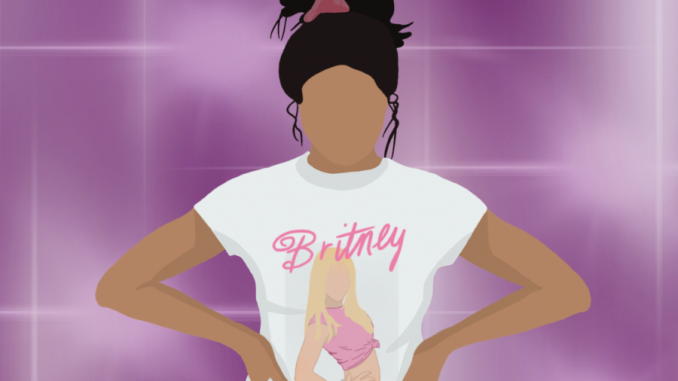
Content warning: This article discusses topics around eating disorders that may be triggering for some readers.
I never understood why Britney Spears’ breakdown in 2007 was continuously laughed at years after it occurred. When I look back at her behavior during that time, I don’t see an erratic party monster or ticking time bomb.
I only see a woman struggling with her well-being and in need of empathy. I see someone like myself.
The latest “The New York Times Presents” episode, “Framing Britney Spears,” depicts her legal battle against the conservatorship that prevents her from overseeing her personal finances and career. As a result, her fans have been campaigning for the lift of the conservatorship or right for Spears to hire her own lawyer, according to The Independent.
After watching the episode, I’ve been reevaluating Spears’ influence on me as a teenager. I wonder if she felt just as trapped as I did by the societal standards set for women when she attained unimaginable fame at 17.
I became unrecognizable to those around me when I was 13 and battling an eating disorder. I was unable to focus in class, constantly fixating on my hunger and skipping periods to go to the bathroom.
Society has an inclination to scrutinize teenage girls for every little thing.
When I cried in the school courtyard over how many calories I consumed that day or obsessed about the blemishes on my skin, it was easy to dismiss my behavior as classic teen girlhood. When Spears was depicted hitting paparazzi cars with umbrellas or losing interest during photoshoots, it wasn’t hard to shrug her off as another off-the-rails diva.
It’s more complicated to acknowledge that these behaviors cannot simply be attributed to character flaws, but that they often stem from a baneful society that demands too much from its female youth. It’s easier to villainize a teenage girl than it is to humanize her.
It’s always felt unnatural for me to relate to a multimillionaire I’ve never met, yet, the universal agreement that Spears was the wrongdoer responsible for the demise of her relationship with Justin Timberlake in 2002 is something I find unnervingly relatable.
I spent my early adolescence convinced I was the villain because many adults in my life couldn’t bear to be around me. They disliked that I was louder and snappier than usual without realizing that I was also sadder and hungrier.
During that time, my performance in school plummeted and I was constantly trading my lunches for detentions. Although I devised countless excuses when I was yelled at for my disagreeable behavior, I may have come clean if someone had just asked me “Why?”
Regardless of how many times I reimagine my middle school experiences, it wouldn’t alter the sting of reality. I was the perfect student before my eating disorder, but like Spears, I became defined by my shortcomings.
I viewed Spears’ experience as a cautionary tale. “See, this is what happens when you ask for help,” I thought to myself.
But Britney Spears isn’t a cautionary tale. She’s a person.
It’s that societal refusal to perceive teenage girls and young women as complex beings that are capable of more than superficiality that I believe played such a large role in Spears’ distress and the struggles of countless others like myself.
The people around us assumed Spears and I were just acting out and simply making all the wrong choices. In my situation, the bad decisions I made felt like my only options.
I no longer feel powerless like I did seven years ago. Instead, I now have the capacity to understand that what I needed back then was to be treated like a human, to receive empathy.
I was ridiculed for caring so much about the same appearance I was told defined me.
While I wish the world had shown Spears and me some more empathy, I understand that empathy doesn’t sell magazines or establish punchlines in talk shows. It doesn’t solve your problems when you have hundreds of other students to worry about or when the quiet, awkward girl in class decides she’s never going to remain silent again.
Spears was like me. “See, this is what happens when you’re a teenage girl defined by your struggles,” I now think to myself.


Be the first to comment